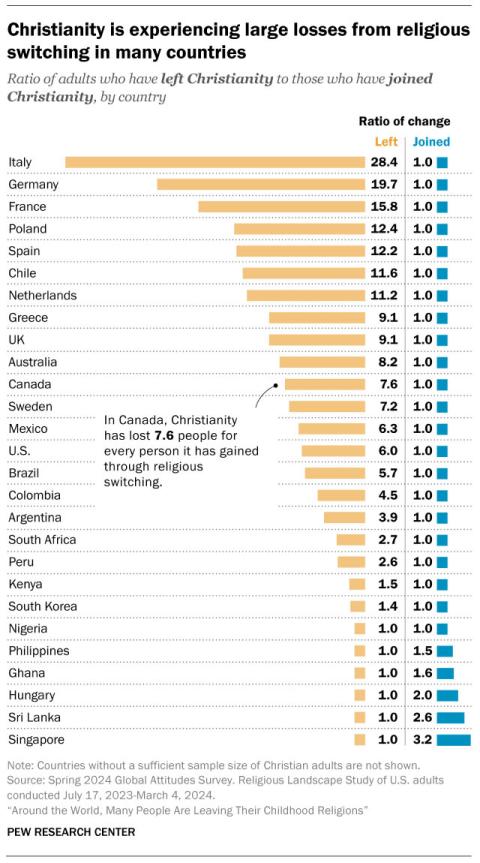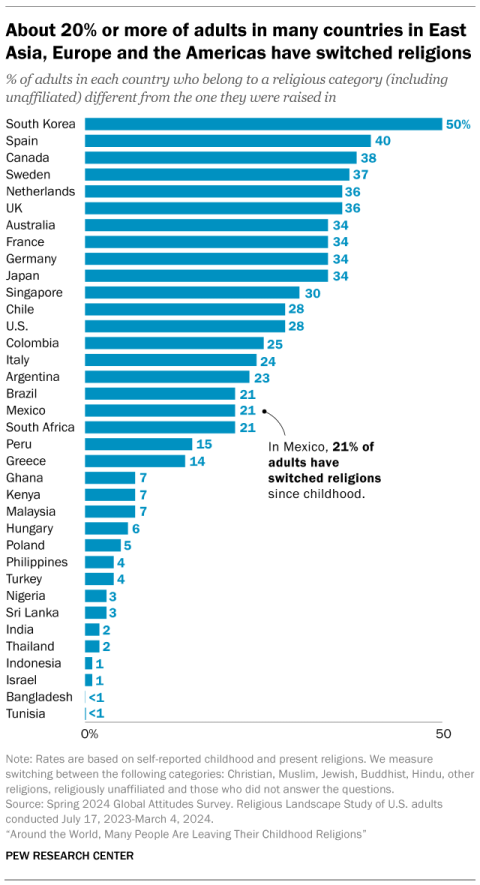
(Unsplash/Wes Branch)
New research shows a widespread trend of people either leaving the religion they were raised in or completely dropping religion, with Christianity taking a particularly big hit.
At least one-fifth of all adults in many countries around the world are no longer a part of the religion they were raised in, a new report from Pew Research Center shows. Christianity and Buddhism have seen the highest rates of disaffiliation, the survey results show.
This trend varies substantially among countries. Half of people in South Korea, for example, are no longer the religion they were raised in, whereas in Poland, for example, that's only the case for 5% of people.
In parts of Europe, the difference between the number of people who have left Christianity — whether or not they adopted another religious tradition — compared to those who have joined Christianity's numbers is stark. Pew said that Christianity was the religion in most countries that had the highest ratios of people who are leaving the religion compared to those joining. In Italy, for example, 28.4 people have left the religion for every person who has joined.
People are also leaving religion altogether. In 21 of the 36 countries Pew looked at, more people have joined the group of people considered religiously unaffiliated than left that group. In Italy, for example, 28.7 people became religiously unaffiliated for every one person who left that category. In the U.S., that ratio was 5.9 to 1.
Hungary was an outlier. For every one person who became religiously unaffiliated, 1.9 people left that category, Pew's research showed.
Pew said that the trends it found didn't differ or didn't differ much among age, education level or gender for most of the countries it surveyed. And the biggest trend among age groups in most instances is people moving from affiliating with one religion to disaffiliating with religion overall, which has been more of a trend among younger people, Pew said.
"These age patterns might be signs of secularization, indicating that countries like Spain, Canada, Italy and the U.S. are gradually becoming less religious," Pew said in its report. But age differences in religious affiliation it found could also be "from people becoming more religious as they grow older."
Advertisement
Only a few countries are seeing more people join Christianity than drop it, including the Philippines, Ghana, Hungary, Sri Lanka and Singapore, the study showed. In looking at net losses for Christianity, Spain stands out among 27 countries analyzed: Pew said the country has seen the highest net losses of Christians — in proportion to its population.
The survey found, however, that more broadly, most adults who grew up Christian still affiliate with that tradition. The number of people considered religiously unaffiliated has grown on a net basis but when people who were raised unaffiliated leave that group, they're largely switching to Christianity, according to Pew.
Buddhism has also seen "relatively high levels" of people switching out of or leaving the religion, Pew said, but it noted that only six of the countries it looked at have large enough sample sizes for analysis.
Of the 13 countries that had large enough sample sizes to analyze, researchers found "very small percentages" of adults have either joined or left Islam, with Muslims having high retention rates in several countries.
Just four countries had big enough sample sizes to analyze Hinduism, Pew said, and they all had small shares of the population who either became affiliated with or left the faith.
Pew also found that few people in the total U.S. adult population have either joined or become disaffiliated with Judaism, and that Judaism has high retention rates in the U.S. and Israel.
In the U.S., Pew surveyed nearly 37,000 people over a nearly eight-month period as part of its Religious Landscape Study. For the part of this study not including the U.S., Pew surveyed more than 41,000 people across nearly three dozen countries over a nearly five-month period in 2024. Pew's research didn't look at people who switched religions under the same faith umbrella, such as between Protestants and Catholics, it said.







